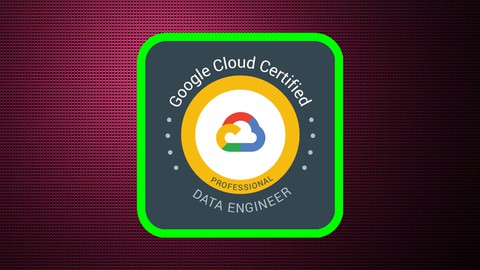Google Cloud Professional Data Engineer (PDE) Practice Exam.


Price: 19.99$
Are you ready to take your data engineering skills to the next level? Look no further than the Google Cloud Professional Data Engineer Practice Exam! This comprehensive exam is designed to test your knowledge and skills in all areas of data engineering, from data processing and storage to machine learning and data analysis. The Google Cloud Professional Data Engineer Practice Exam is a comprehensive and reliable tool designed to help aspiring data engineers prepare for the Google Cloud Professional Data Engineer certification exam. This practice exam is created by industry experts and is based on the latest exam pattern and syllabus. It includes a set of challenging questions that cover all the essential topics related to data engineering, such as data processing, data analysis, data visualization, and machine learning. The Google Cloud Professional Data Engineer Practice Exam is an excellent resource for individuals who want to assess their knowledge and skills in data engineering and identify areas that require improvement. It provides a realistic exam experience, allowing candidates to familiarize themselves with the exam format, time constraints, and difficulty level. Moreover, the practice exam comes with detailed explanations and references to relevant Google Cloud documentation, enabling candidates to understand the concepts and principles behind each question. The Google Cloud Professional Data Engineer Practice Exam is suitable for both beginners and experienced data engineers who want to enhance their expertise and credibility in the field. It is an affordable and convenient way to prepare for the certification exam, as it can be accessed online from anywhere and at any time. With the Google Cloud Professional Data Engineer Practice Exam, candidates can increase their chances of passing the certification exam and advancing their career in data engineering. Google Cloud Professional Data Engineer Certification exam details: Exam Name: Google Cloud Professional Data Engineer Exam Code: GCP-PDEPrice: $200 USD Duration: 120 minutes Number of Questions 50-60 Passing Score: Pass / Fail (Approx 70%)Format: Multiple Choice, Multiple Answer, True/False Google Cloud Professional Data Engineer Exam guide: Section 1: Designing data processing systems1.1 Selecting the appropriate storage technologies. Considerations include:● Mapping storage systems to business requirements● Data modeling● Trade-offs involving latency, throughput, transactions● Distributed systems● Schema design1.2 Designing data pipelines. Considerations include:● Data publishing and visualization (e. g., Big Query)● Batch and streaming data● Online (interactive) vs. batch predictions● Job automation and orchestration (e. g., Cloud Composer)1.3 Designing a data processing solution. Considerations include:● Choice of infrastructure● System availability and fault tolerance● Use of distributed systems● Capacity planning● Hybrid cloud and edge computing● Architecture options● At least once, in-order, and exactly once, etc., event processing1.4 Migrating data warehousing and data processing. Considerations include:● Awareness of current state and how to migrate a design to a future state● Migrating from on-premises to cloud (Data Transfer Service, Transfer Appliance, Cloud Networking)● Validating a migration Section 2: Building and operationalizing data processing systems2.1 Building and operationalizing storage systems. Considerations include:● Effective use of managed services● Storage costs and performance● Life cycle management of data2.2 Building and operationalizing pipelines. Considerations include:● Data cleansing● Batch and streaming● Transformation● Data acquisition and import● Integrating with new data sources2.3 Building and operationalizing processing infrastructure. Considerations include:● Provisioning resources● Monitoring pipelines● Adjusting pipelines● Testing and quality control Section 3: Operationalizing machine learning models3.1 Leveraging pre-built ML models as a service. Considerations include:● ML APIs (e. g., Vision API, Speech API)● Customizing ML APIs (e. g., Auto ML Vision, Auto ML text)● Conversational experiences (e. g., Dialogflow)3.2 Deploying an ML pipeline. Considerations include:● Ingesting appropriate data● Retraining of machine learning models● Continuous evaluation3.3 Choosing the appropriate training and serving infrastructure. Considerations include:● Distributed vs. single machine● Use of edge compute● Hardware accelerators (e. g., GPU, TPU)3.4 Measuring, monitoring, and troubleshooting machine learning models. Considerations include:● Machine learning terminology● Impact of dependencies of machine learning models● Common sources of error (e. g., assumptions about data)Section 4: Ensuring solution quality4.1 Designing for security and compliance. Considerations include:● Identity and access management (e. g., Cloud IAM)● Data security (encryption, key management)● Ensuring privacy (e. g., Data Loss Prevention API)● Legal compliance4.2 Ensuring scalability and efficiency. Considerations include:● Building and running test suites● Pipeline monitoring (e. g., Cloud Monitoring)● Assessing, troubleshooting, and improving data representations and data processing infrastructure● Resizing and autoscaling resources4.3 Ensuring reliability and fidelity. Considerations include:● Performing data preparation and quality control (e. g., Dataprep)● Verification and monitoring● Planning, executing, and stress testing data recovery● Choosing between ACID, idempotent, eventually consistent requirements4.4 Ensuring flexibility and portability. Considerations include:● Mapping to current and future business requirements● Designing for data and application portability (e. g., multicloud, data residency requirements)● Data staging, cataloging, and discovery Benefits of the Certification: The Google Cloud Professional Data Engineer certification is a highly sought-after credential that validates an individual’s expertise in designing, building, and managing data processing systems on the Google Cloud Platform. This certification is designed for professionals who are responsible for creating and maintaining data pipelines, transforming and processing data, and implementing machine learning models. The benefits of obtaining the Google Cloud Professional Data Engineer certification are numerous. Firstly, it demonstrates a high level of proficiency in the field of data engineering, which is a critical skill in today’s data-driven business environment. This certification is recognized globally and is highly valued by employers, making it a valuable addition to one’s professional portfolio. Secondly, the certification provides individuals with a comprehensive understanding of the Google Cloud Platform’s data processing capabilities, including its data storage, processing, and analysis tools. This knowledge enables professionals to design and implement efficient and scalable data processing systems that can handle large volumes of data. Thirdly, the certification equips individuals with the skills to implement machine learning models on the Google Cloud Platform, enabling them to leverage the power of artificial intelligence to gain insights from data. This is a highly sought-after skill in today’s business environment, where data-driven decision-making is becoming increasingly important. In conclusion, the Google Cloud Professional Data Engineer certification is a valuable credential that provides individuals with the skills and knowledge to design, build, and manage data processing systems on the Google Cloud Platform. It is a globally recognized certification that is highly valued by employers and is a valuable addition to one’s professional portfolio. Features of Practice Tests: Premium quality questions + Detailed solution explanations Reference links to the official GCP docs & other reliable sources Course materials based on the latest syllabus Gain knowledge, skills, & confidence Practice full-length exams in a single sitting Practice tricky questions Learn exam time management + Pressure handling Active course instructor to help, guide, and solve your doubts within 24-48 Hrs Lifetime course access to help you re-certify in the future Mobile-compatible course for your convenience – Just download the Udemy mobile app and get started You can skip a question to come back to at the end of the exam. You can also use “Mark for Review” to come back to questions you are unsure about before you submit your test. If you want to finish the test and see your results immediately, press the stop button.






